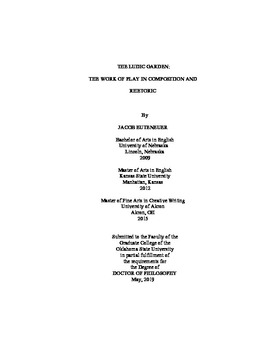| dc.description.abstract | This dissertation explores the intersections between play and game studies and composition and rhetoric. Through an analysis of the provenance of the five canons of ancient rhetoric, invention, arrangement, style, memory, and delivery, this dissertation argues that new media, exemplified by video games, can help us reconceptualize and revitalize composition and rhetoric for our increasingly digital world. In Chapter 1, memory is examined in relation to identity and agency in order to demonstrate the productive overlaps between the act of writing and the act of playing. Invention is the focus of Chapter 2. Breaking down games into the constituent parts of materials, limits, and goals allows composers to create games that model systems or ideologies. Composers can then play these created games as a way to formulate, understand, and test their understanding of the world. Chapter 3 looks at style and differentiates between three types of style operating in digital games: representational style, procedural style, and ludic style. Emphasizing the actions and decisions of the player, ludic style can be a powerful tool to help composers identify, experience, and enact tropes and schemes. Chapter 4 looks at both arrangement and delivery and argues that in new media, the two happen simultaneously. Through an analysis of propaganda in video games, this chapter argues that the patterning of objects in games and subsequent delivery of the propaganda through the performance of the player represents a powerful new avenue to disseminate propaganda. The dissertation is concluded with Chapter 5, a pedagogical take on how the ancient canons of rhetoric can help identify conspicuous computing through the use of play and games to subvert hegemonic views and dominating ideologies. Taken as a whole, this dissertation demonstrates how play and writing can inform each other and promote understanding of the ways new media shapes how we communicate, how we make meaning of the digital world, and how we can use this to produce better writers, players, and citizens. | |
